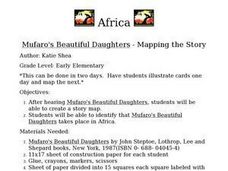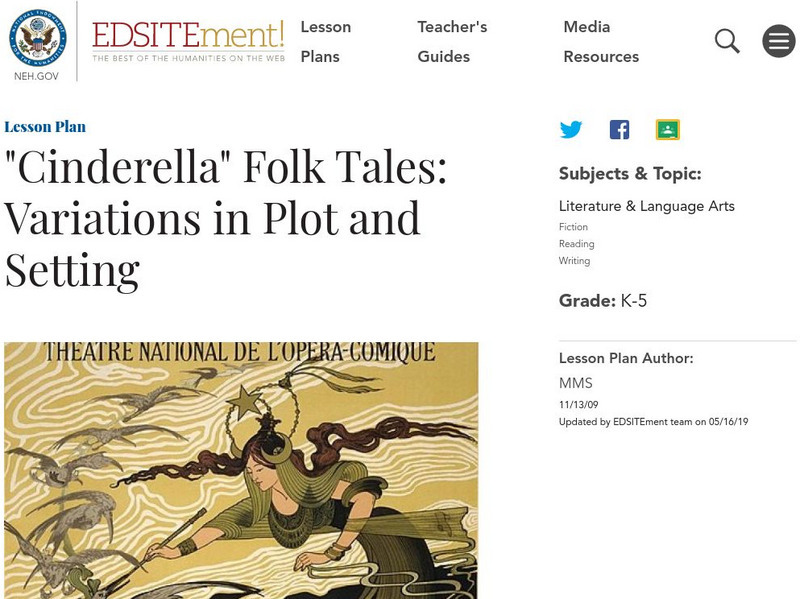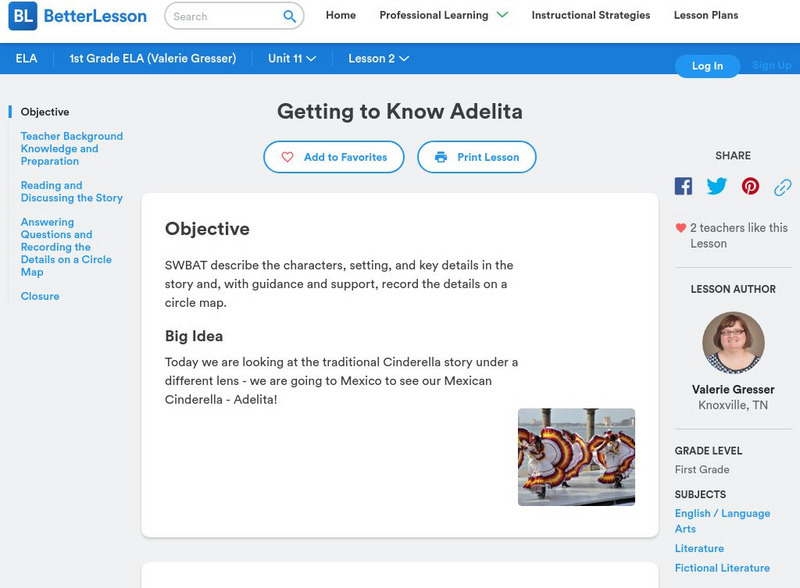Curated OER
Cloudy With a Chance of Meatballs
Fourth graders participate in a play to work on seeing events from a different perspective. Some of them are reporters, some cameramen and women, and others are interviewed. They put themselves in the shoes of the people in the book...
Curated OER
6 Word Digital Memoirs
Students discuss the idea of 6 word memoirs. In this technology lesson, students explore how using a small number of words sometimes is the best. Students practice using 6 word memoirs writing six words for various nursery rhymes and...
Curated OER
Fairy Tales
Young scholars write and draw fairy tales based on modern themes and/or their own experiences. The class is divided into groups and are assigned a fairy tale. The groups develop a modern story based on this fairy tale through group...
Curated OER
Mufaro's Beautiful Daughters - Mapping the Story
Learners listen to John Steptoe's story, "Mufaro's Beautiful Daughters" and create a story map.
Curated OER
Japanese Folktales
Students read both Japanese and American folktales and respond to teacher generated questions. They compare the folktales and determine if there is a lesson to be learned. They draw story card to retell the story to the class.
Curated OER
Fiction Elements in Hatchet
Students read or listen to Hatchet by Gary Paulsen, identify elements of fiction, develop writing, thinking, and organizing skills, and create PowerPoint slides based on the story.
Curated OER
Adjectives
Students are encouraged to think about the adjectives they choose and to steer away from adjectives that have become meaningless through overuse, such as "nice" and "good." They then add meaning and interest to sentences.
Curated OER
Descriptive Writing
Second graders analyze descriptive writing. In this writing lesson, 2nd graders read a story with a villain, describe the villain in words, and create a Wanted Poster describing him on paper.
Curated OER
Stories of Nepal
Students explore folktales and fairy tales from Nepal to help them understand the Nepalese culture, and to compare the stories to the ones the students may know. After reading the stories, students consider what rural life is like in...
Curated OER
Multicultural Fairy Tales
Third graders explore the elements of a story using fairy tales from all over the world. They compare and contrast story elements, key ideas and concepts found in a variety of texts from around the world.
Annenberg Foundation
Annenberg Learner: Story Elements Using Cinderella
Listen to an explanation of the story elements in Cinderella including exposition, characters, setting, sequence, conflict, climax, and resolution.
Alabama Learning Exchange
Alex: Exploring the World of Cinderella Tales
Young scholars will read three different Cinderella tales, including tales from Africa, China, and America. Upon completion of a Venn diagram comparing the similarities and differences of these tales, the students will complete and...
Birmingham Grid for Learning (UK)
Birmingham Grid for Learning: Story Telling: Cinderella
Click through a book to read and view illustrations of the story "Cinderella." Click the links below the book to open word documents with additional activities focusing on the characters, setting, sequencing, illustrations, line...
Better Lesson
Better Lesson: Comparing Two Cinderella Stories
Students will compare two characters and list their comparisons on a graphic organizer using modern Cinderella stories. This lesson includes a detailed lesson plan for guided practice and partner work, and a video of students engaged in...
National Endowment for the Humanities
Neh: Edsit Ement: Variations in Plot and Setting
Although Disney's version of Cinderella is most popular in America, hundreds of versions exist across many cultures. This resource provides lessons, which examine the similarities and differences in literary elements among many versions...
Annenberg Foundation
Annenberg Learner: Characters
Learn about the different types of characters in Cinderella, and determine which traits belong to the hero and villain. Click on the "Character" button.
Annenberg Foundation
Annenberg Learner: Interactives: Elements of a Story: Characters
The interactive story lesson engages students in the study of "characters" and terms associated with them. Using the story of Cinderella as an anchor story, students will identify the following: hero, villain, protagonist, antagonist,...
National Endowment for the Humanities
Neh: Edsit Ement: Cinderella Folk Tales (Lesson Plans)
These five activities allow students to explore the various Cinderella folktales, while comparing and contrasting the characters. They provide lesson extensions, links to charts, discussion questions and the like.
Better Lesson
Better Lesson: Getting to Know Adelita
In this lesson plan, 1st graders will describe the characters, setting, and key details in "Adelita: A Mexican Cinderella" by Tomie de Paolaby. With guidance and support, students will record the details on a circle map.
Annenberg Foundation
Annenberg Learner: Interactives: Elements of a Story
Explore the elements of a story using the well-known Cinderella story as source material. Learn about setting, character, sequence, exposition, conflict, climax, and resolution.
Annenberg Foundation
Annenberg Learner: Elements of a Story Interactive
Explore different ingredients, or elements, that go into stories and make them so much fun. Read the story, "Cinderella," and look at all the different pieces of the tale to see how they all fit together.
Birmingham Grid for Learning (UK)
Birmingham Grid for Learning: Story Time
Five familiar children's stories have been adapted and illustrated for this site. Students may "read along" and identify settings, characters, sequencing, and more. It also provides printable worksheets, copies of the text and the...



















